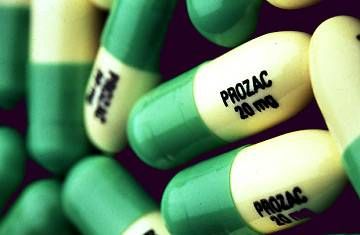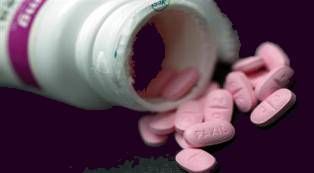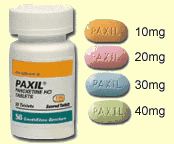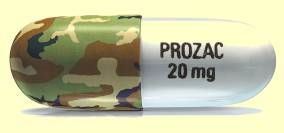


SSRI Antidepressants No Better Than Placebo Says JAMA
by Jeffrey Dach MD
A study just published in JAMA Jan 5, reported that SSRI antidepressants are no better than placebo for most cases of depression. The authors reviewed 30 years of data and concluded that "the benefit of antidepressant medication compared with placebo may be minimal or nonexistent in patients with mild or moderate symptoms".
Of course, this is old news, and reminds me of the famous scene in 1942 film, Casablanca, where Captain Louis Renault declares, " I am Shocked, Shocked ... to find gambling here....Here is your winnings... Oh thank you." See clip below:
Better than Placebo for Severe Depression
I should add that the study found antidepressants work better than placebo for severe depression. This is not surprising, since virtually any psycho-stimulant can be found useful for the most the severely depressed patient.
 Is Depression Really a Medical Disease?
Is Depression Really a Medical Disease?
Medically speaking, the term "Depression" is a vague constellation of feelings and symptoms scored by a questionnaire called the Hamilton Depression Score.
How to Score Depression as Mild, Moderate or Severe? Online Tools
There are a number of handy on-line tools for taking the Hamilton Depression Score Questionnaire. Here is one of them: For the short 17-item version of the Hamilton questionnaire, scores can range from 0 to 54. Hamilton scores between 0 and 6 are normal. Scores between 7 and 17 indicate mild depression, scores between 18 and 24 indicate moderate depression, and scores over 24 indicate severe depression. According to the Jan 5 JAMA study, if your Hamilton score is less than 24, then placebo is just as effective as antidepressant drugs. That means they work about the same as a sugar pill.
Here are the Hamilton Depression Score Questions (short version):
Mood (Are you sad, hopeless, helpless, worthless?)
Feeling of Guilt (Do you have feelings of guilt, or self reproach?)
Do you have Suicide ideas, gestures or attempts?
INSOMNIA (Do you have difficulty falling asleep, staying asleep?)
WORK AND ACTIVITIES (Do you have thoughts and feelings of fatigue or weakness related to activities, or decreased or Stopped activities or working because of present illness?)
Do you have Slowness of thought and speech; Do you have difficulty concentrating; slow movements)?
AGITATION (Do you have Fidgeting, Playing with hands, hair, etc, Moving about, can't sit still. Hand wringing, nail biting, hair-pulling, biting of lips etc)?
ANXIETY (Do you have tension and irritability, Worrying, Apprehension, Fears expressed)?
ANXIETY: SOMATIC (Do you have dry mouth, wind, indigestion, diarrhea, cramps, belching. - Cardio-vascular : palpitations, headaches. hyperventilation, sighing. Urinary frequency - Sweating)?
SOMATIC SYMPTOMS: GASTROINTESTINAL Do you have Loss of appetite, require laxatives or medication for bowels, or medication for gastro-intestinal symptoms?
SOMATIC SYMPTOMS: GENERAL - Do you have Heaviness in limbs, back or head? Backaches, headache, muscle aches. Loss of energy and fatigability?
GENITAL SYMPTOMS -Do you have loss of libido, menstrual disturbances?
HYPOCHONDRIASIS - Do you have preoccupation with your health.?
LOSS OF WEIGHT -Do you have weight loss from depression.?
INSIGHT - Acknowledges or denies being depressed. ?
Overlapping Symptoms- Is it Really Depression ?
 As is obvious, many of these feelings or symptoms are somewhat subjective and rather vague, so depression scoring is not an exact science and can be manipulated according to the agenda of the research or questioner. As you can see, many of these Hamilton symptoms overlap with real medical diseases. For example patients with inflammatory bowel disease or celiac disease would score positive for the GI symptoms even though they may not be clinically "depressed". Somatic symptoms of fatigue and muscle pain may overlap with fibromyalgia and hypothyroid symptoms. Slowness of thought and speech could overlap with a low thyroid condition or a neurological disorder such as B12 deficiency. Patients in chronic severe pain contemplating suicide may not necessarily indicate clinical "depression". Obviously, these patients need pain relief rather than an SSRI antidepressant.
As is obvious, many of these feelings or symptoms are somewhat subjective and rather vague, so depression scoring is not an exact science and can be manipulated according to the agenda of the research or questioner. As you can see, many of these Hamilton symptoms overlap with real medical diseases. For example patients with inflammatory bowel disease or celiac disease would score positive for the GI symptoms even though they may not be clinically "depressed". Somatic symptoms of fatigue and muscle pain may overlap with fibromyalgia and hypothyroid symptoms. Slowness of thought and speech could overlap with a low thyroid condition or a neurological disorder such as B12 deficiency. Patients in chronic severe pain contemplating suicide may not necessarily indicate clinical "depression". Obviously, these patients need pain relief rather than an SSRI antidepressant.
 Hormonal Imbalance Symptoms Overlap with Many of the Hamilton Symptoms
Hormonal Imbalance Symptoms Overlap with Many of the Hamilton Symptoms
Many women with hormonal imbalance related to pre-menopause or post menopausal transitions will have mood disorders and symptoms which overlap with many of the symptoms on the Hamilton Depression Score.
For example, the term Premenstrual Dysphoric Disorder is commonly treated with SSRI antidepressants by mainstream primary care and OB/Gyne Docs. Premenstrual Dysphoric Disorder is a manufactured term made up by the drug companies to sell SSRI drugs and in reality, attempts to redefine the original term, PMS (premenstrual syndrome).

With the Jan 5, 2010 JAMA article, we now have evidence that Premenstrual Dysphoric Disorder and other common forms of hormonal imbalance are poorly served by SSRI antidepressants. Using SSRI's is simply the wrong way. The benefit of SSRI antidepressants for this group is the same as the benefit from placebo. Rather, this group of women should be properly evaluated, and then treated with bioidentical hormones to address their underlying problem. We have noted considerable success using cyclic natural progesterone in this group of women with PMS and other hormonal imbalances. In my opinion, natural progesterone is a far better form of treatment with none of the adverse side effects associated with SSRI antidepressants.
Adverse Side Effects of Antidepressants - Placebos Have NONE
When placebo and SSRI antidepressants are compared and found equally effective, the next question relates to adverse side effects. By definition, placebos have no adverse side effects. However, this is not true for antidepressants which have the following adverse effects: Sexual dysfunction, weight gain and sleep disturbance are the most troubling adverse effects of SSRI anti-depressant therapy. The most common side effects associated with SSRI antidepressants are nausea, headache, nervousness, insomnia and sexual dysfunction. More side effects are listed here.
 SSRIs and Suicide Risk
SSRIs and Suicide Risk
Another troubling adverse effect of SSRI antidepressants is increased suicide first reported by Teicher in 1990. According to David Healy (Let then Eat Prozac), the original clinical trial data was manipulated by moving the suicide cases from the treatment arm over to the placebo arm of the study. This manipulated data was then submitted to the FDA who conveniently looked the other way. This disturbing information was presented at a Cornell University Mar 25, 2009 talk by David Healy which can be seen here on You Tube.
The Army and Military Suicide from SSRIs Antidepressant Use
 Another striking finding is the unprecedented increased suicide rate in the military with widespread use of SSRI's and other psycho active drugs in the Army. Again this is a rather sad commentary, and another nail in the coffin for SSRI drugs as being more harmful than helpful.
Another striking finding is the unprecedented increased suicide rate in the military with widespread use of SSRI's and other psycho active drugs in the Army. Again this is a rather sad commentary, and another nail in the coffin for SSRI drugs as being more harmful than helpful.
Articles with Related Interest:
SSRI Drugs and Overcome Depression Naturally by Jeffrey Dach MD
Paxil, Prozac and SSRI Induced Suicide by Jeffrey Dach MD
Protect Your Family from Bad Drugs by Jeffrey Dach MD
Jeffrey Dach MD
7450 Griffin Rd Suite 180/190
Davie, FL 33314
Phone: 954-792-4663
Email: drdach@drdach.com
Facebook
Blog
Links and References:
http://jama.ama-assn.org/cgi/content/short/303/1/47?home
Antidepressant Drug Effects and Depression Severity A Patient-Level Meta-analysis by Jay C. Fournier, MA; Robert J. DeRubeis, PhD; Steven D. Hollon, PhD; Sona Dimidjian, PhD; Jay D. Amsterdam, MD; Richard C. Shelton, MD; Jan Fawcett, MD in JAMA. 2010;303(1):47-53.
Antidepressant medications represent the best established treatment for major depressive disorder, but there is little evidence that they have a specific pharmacological effect relative to pill placebo for patients with less severe depression.
Objective To estimate the relative benefit of medication vs placebo across a wide range of initial symptom severity in patients diagnosed with depression.
Data Sources PubMed, PsycINFO, and the Cochrane Library databases were searched from January 1980 through March 2009, along with references from meta-analyses and reviews.
Study Selection Randomized placebo-controlled trials of antidepressants approved by the Food and Drug Administration in the treatment of major or minor depressive disorder were selected. Studies were included if their authors provided the requisite original data, they comprised adult outpatients, they included a medication vs placebo comparison for at least 6 weeks, they did not exclude patients on the basis of a placebo washout period, and they used the Hamilton Depression Rating Scale (HDRS). Data from 6 studies (718 patients) were included.
Data Extraction Individual patient-level data were obtained from study authors.
Results Medication vs placebo differences varied substantially as a function of baseline severity. Among patients with HDRS scores below 23, Cohen d effect sizes for the difference between medication and placebo were estimated to be less than 0.20 (a standard definition of a small effect). Estimates of the magnitude of the superiority of medication over placebo increased with increases in baseline depression severity and crossed the threshold defined by the National Institute for Clinical Excellence for a clinically significant difference at a baseline HDRS score of 25.
Conclusions The magnitude of benefit of antidepressant medication compared with placebo increases with severity of depression symptoms and may be minimal or nonexistent, on average, in patients with mild or moderate symptoms. For patients with very severe depression, the benefit of medications over placebo is substantial.
“What makes our findings surprising is the high level of depression symptom severity that appears to be required for clinically meaningful drug/placebo differences to
emerge, particularly given the evidence that the majority of patients receiving
ADM in clinical practice present with scores below these levels.”
http://www.plosmedicine.org/article/info:doi/10.1371/journal.pmed.0050045
Initial Severity and Antidepressant Benefits: February 26, 2008
A Meta-Analysis of Data Submitted to the Food and Drug Administration
Irving Kirsch1*, Brett J. Deacon2, Tania B. Huedo-Medina3, Alan Scoboria4, Thomas J. Moore5, Blair T. Johnson3
1 Department of Psychology, University of Hull, Hull, United Kingdom, 2 University of
Drug–placebo differences in antidepressant efficacy increase as a function of baseline severity, but are relatively small even for severely depressed patients. The relationship between initial severity and antidepressant efficacy is attributable to decreased responsiveness to placebo among very severely depressed patients, rather than to increased responsiveness to medication.
http://www.psychologytoday.com/blog/charting-the-depths/201001/depression-treatment-we-need-better-not-simply-more
Depression treatment: We need better not simply more Getting more people into treatment for depression is not enough
Published on January 5, 2010
http://www.nytimes.com/2010/01/06/health/views/06depress.html?hp
Popular Drugs May Help Only Severe Depression By BENEDICT CAREY Published: January 5, 2010
http://online.wsj.com/article/SB10001424052748703436504574640641607761408.html?mod=rss_Health
JANUARY 6, 2010.Effectiveness of Antidepressants Varies Widely By JENNIFER CORBETT DOOREN
Patients with severe depression benefit most from antidepressant medications while those with less-severe symptoms see little or no benefit, according to a new analysis released Tuesday. Researchers combined the results of six studies involving patients ranging from mildly depressed to very severely depressed as rated on the Hamilton Depression Rating Scale, which doctors use to diagnose patients. The analysis, comparing 718 patients assigned an antidepressant or a placebo, is published in this week's Journal of the American Medical Association.
Robert DeRubeis, a primary author of the analysis and a psychology professor at the University of Pennsylvania, said the bulk of studies evaluating antidepressants involve patients considered severely depressed. Such studies also were used to gain Food and Drug Administration approval for the drugs.
Fewer studies have been conducted involving mildly depressed patients. It isn't clear how well drugs like Paxil or Prozac work on these patients, who account for a large portion of antidepressant use.
According to the National Institute of Mental Health, depression affects approximately 14.8 million American adults, or about 6.7% of the U.S. adult population, in a given year.
Dr. DeRubeis said patients in the severely depressed group had scores improved by an average of four points when taking a drug like GlaxoSmithKline PLC's Paxil, compared with the placebo group, a difference considered "substantial."
He said patients with scores below 23 taking Paxil, or an older drug, imipramine, improved by one point over those taking a placebo. Patients considered to have mild or moderate depression, or a Hamilton score of 18 or less, improved by less than one point. "There is little evidence to suggest that [antidepressants] produce specific pharmacological benefit for the majority of patients with less severe acute depression," researchers wrote.
http://www.upenn.edu/pennnews/article.php?id=1791
Penn Study Shows Antidepressants Work Best for Severe Depression, Provide Little to No Benefit Otherwise
January 05, 2010 PHILADELPHIA –- A study of 30 years of antidepressant-drug treatment data published today in the Journal of the American Medical Association shows that the benefit of antidepressant medication compared with placebo may be minimal or nonexistent in patients with mild or moderate symptoms. University of Pennsylvania researchers say, however, the benefit of medications is substantial for patients with very severe depression.
http://www.pharmalot.com/2010/01/antidepressants-dont-help-mild-depression-analysis/
Antidepressants Don’t Help Mild Depression: Study
http://www.minddisorders.com/Flu-Inv/Hamilton-Depression-Scale.html
In the 17-item version, nine of the items are scored on a five-point scale, ranging from zero to four. A score of zero represents an absence of the depressive symptom being measured, a score of one indicates doubt concerning the presence of the symptom, a score of two indicates mild symptoms, a score of three indicates moderate symptoms, and a score of four represents the presence of severe symptoms. The remaining eight items are scored on a three-point scale, from zero to two, with zero representing absence of symptom, one indicating doubt that the symptom is present, and two representing clear presence of symptoms.
For the 17-item version, scores can range from 0 to 54.
One formulation suggests that scores between 0 and 6 indicate a normal person with regard to depression, scores between 7 and 17 indicate mild depression, scores between 18 and 24 indicate moderate depression, and scores over 24 indicate severe depression.
http://www.cure4you.dk/960/HAMD-17%20Grid%20version%20-%20English.pdf
Hamilton rating scale for depression 17 questions
http://www.real-depression-help.com/hamilton-depression-scale.html
online HMD questionaire - quick score for depression - adjusted for layman
http://www.psy-world.com/online_hamd.htm
online HMD questionaire - quick score for depression - classic printable version
//www.youtube.com/watch?v=-Gf8NK1WAOc
Casablanca is a 1942 film - Captain Louis Renault
I am shocked — shocked— to find that gambling is going on in here!
Adverse side effects of ssris
Problems associated with long term treatment with selective serotonin reuptake inhibitors by Chantal Moret* and Mike Isaac* http://www.psy-world.com/ssri_problems.htm
Sexual dysfunction, weight gain and sleep disturbance are the most troubling adverse events seen during long-term SSRI therapy. The most common side effects associated with SSRIs such as nausea and headache, nervousness, insomnia and sexual dysfunction.
Other Blogs
http://depressioncell.com/article.asp?articleid=73575
The Antidepressant Dilemma - antidepressants have limited-to-zero efficacy for those with mild depression. Yet the drugs have been prescribed to that population in very high numbers (in June 2005, as I've reported before, the International Review of Psychiatry estimated that the total amount prescribed in the U.S. alone has been to upwards of 67.5 million people, almost one quarter of the general population).
http://www.pharmalot.com/2010/01/antidepressants-dont-help-mild-depression-analysis/
Antidepressants Don’t Help Mild Depression: Study By Ed Silverman // January 5th, 2010 // 4:06 pm
http://www.furiousseasons.com/archives/2010/01/
study_antidepressants_ineffective_for_mild_moderate_depression.html
Furious Seasons :Study: Anti-Depressants Ineffective For Mild, Moderate Depression
http://www.time.com/time/health/article/0,8599,1717306,00.html
Antidepressants Hardly Help By LAURA BLUE/LONDON Tuesday, Feb. 26, 2008 Time MAgazine
http://www.srmhp.org/0201/media-watch.html
Antidepressant-Placebo Debate in the Media- Balanced Coverage or Placebo Hype?
A spate of articles has recently appeared in the popular media with such intriguing titles as "Maybe It's All in Your Head," "Make-Believe Medicine," "New Study of Brain Illustrates the Power of Placebo," "Antidepressants: Hype or Help?" and "Misguided Medicine: A Stunning Finding about Antidepressants Is Being Ignored," to name but a few. Journalists have found a new public-interest story about mental health that readers seem to be hungry for-the antidepressant versus placebo controversy.
References
Burne, J. (2002, June 20). Make-believe medicine. The Guardian. Retrieved February 1, 2003, from http://www/. guardian.co.uk/Archive/Article/0,4273,4444420,00.html.
Gaudiano, B. A., & Herbert, J. D. (2003). Methodological issues in clinical trials of antidepressant medications: Perspectives from psychotherapy outcome research. Manuscript under review.
Kessler, R. C., McGonagle, K. A., Zhao, S., Nelson, C. B., Hughes, M., Eshleman, S., et al. (1994). Lifetime and 12-month prevalence of DSM-III-R psychiatric disorders in the United States: Results from the national comorbidity survey. Archives of General Psychiatry, 51, 8-19.
Khan, A., Leventhal, R. M., Khan, S., & Brown, W. A. (2002). Severity of depression and response to antidepressants and placebo: An analysis of the Food and Drug Administration database. Journal of Clinical Psychopharmacology, 22, 40-45.
Kirsch, I., Moore, T. J., Scoboria, A., & Nicholls, S. S. (2002). The emperor's new drugs: An analysis of antidepressant medication data submitted to the U.S. Food and Drug Administration. Prevention & Treatment, 5, art. 23. Retrieved February 1, 2003, from http://journals.apa.org/prevention/volume5/pre0050023a.html.
Kirsch, I., & Sapirstein, G. (1998). Listening to Prozac but hearing placebo: A meta-analysis of antidepressant medication. Prevention & Treatment, 1, art. 0002a. Retrieved February 1, 2003, from http://journals.apa.org/prevention/volume1/pre0010002a.html.
Klein, D. F. (1998). Listening to meta-analysis but hearing bias. Prevention & Treatment, 1, art. 0006c. Retrieved February 1, 2003, from http://journals.apa.org/prevention/volume1/pre0010006c.html.
Leber, P. (2000). The use of placebo control groups in the assessment of psychiatric drugs: An historical context. Biological Psychiatry, 47, 699-706.
Leuchter, A. F., Cook, I. A., Witte, E. A., Morgan, M., & Abrams, M. (2002). Changes in brain function of depressed subjects during treatment with placebo. American Journal of Psychiatry, 159, 122-129.
Lohr, J. M., Lilienfeld, S. O., Tolin, D. R., Herbert, J. D. (1999). Eye movement desensitization and reprocessing: An analysis of specific versus nonspecific treatment factors. Journal of Anxiety Disorder, 13, 185-207.
Mayberg, H. S., Silva, J. A., Brannan, S. K., Tekell, J. L., Mahurin, R. K., McGinnis, S., & Jerabek, P. A. (2002). The functional neuroanatomy of the placebo effect. American Journal of Psychiatry, 159, 728-737.
Moore, T. J. (1999, October 17). No prescription for happiness. Boston Globe, E01. Retrieved February 1, 2003, from http://www.thomasjmoore.com/pages/prozpop.html.
Moncrieff, J., Wessely, S., & Hardy, R. (2002). Active placebos versus antidepressants for depression (Cochrane Review). The Cochrane Library, 1. Oxford: Update Software.
Quitkin, F. M., Rabkin, J. G., Gerald, J., Davis, J. M., & Klein, D. F. (2000). Validity of clinical trials of antidepressants. American Journal of Psychiatry, 157, 327-337.
Rosenthal, R. (1979). The "file drawer problem" and tolerance for null results. Psychological Bulletin, 86, 638-641.
Vedantam, S. (2002, May 7). Against depression, a sugar pill is hard to beat. Washington Post, A01. Retrieved February 1, 2003, from http://www.washingtonpost.com/ac2/wp-dyn/A42930-2002May6.
Suicide and the Military on SSRIs
http://www.time.com/time/nation/article/0,8599,1811858,00.html
America's Medicated Army- By Mark Thompson Thursday, Jun. 05, 2008
R.D. Gibbons, C.H. Brown, K. Hur, S.M. Marcus, D.K. Bhaumik, and J.J.
Mann, "Relationship Between Antidepressants And Suicide Attempts: An Analysis of the Veterans Health Administration Data Sets," American Journal of Psychiatry 164 (2007): 1044-1049.
Valenstein M, Kim HM, Ganoczy D, McCarthy JF, Zivin K, Austin KL, Hoggatt K, Eisenberg D, Piette JD, Blow FC, Olfson M. Higher-risk periods for suicide among VA patients receiving depression treatment: prioritizing suicide prevention efforts. Journal of Affective Disorders, 2009 Jan;112(1-3):50-8.
M. Raja, A. Azzoni, and A.E. Koukopoulos, "Psychopharmacological treatment before suicide attempt among patients admitted to a Psychiatric Intensive Care Unit,"
Journal of Affective Disorders 113 (2009): 37-44.
Disclaimer click here: www.drdach.com/wst_page20.html
The reader is advised to discuss the comments on these pages with his/her personal physicians and to only act upon the advice of his/her personal physician. Also note that concerning an answer which appears as an electronically posted question, I am NOT creating a physician -- patient relationship. Although identities will remain confidential as much as possible, as I can not control the media, I can not take responsibility for any breaches of confidentiality that may occur.
Link to this article:http://www.drdach.com/Antidepressants_Placebo.html
Copyright (c) 2010-2014 Jeffrey Dach MD All Rights Reserved. This article may be reproduced on the internet without permission, provided there is a link to this page and proper credit is given.
FAIR USE NOTICE: This site contains copyrighted material the use of which has not always been specifically authorized by the copyright owner. We are making such material available in our efforts to advance understanding of issues of significance. We believe this constitutes a 'fair use' of any such copyrighted material as provided for in section 107 of the US Copyright Law. In accordance with Title 17 U.S.C. Section 107, the material on this site is distributed without profit to those who have expressed a prior interest in receiving the included information for research and educational purposes.